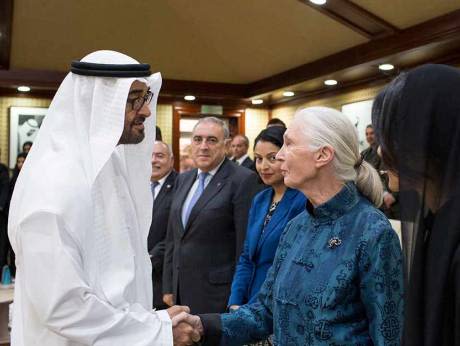 |
| Dr. Jane Goodall and Sheikh Mohammed bin Zayed |
Renowned primatologist and environmentalist Dr. Jane Goodall has recently applauded the United Arab Emirates' conservation efforts and Sheikh Mohammed bin Zayed's insight in laying the basis for the country's environmental protection. She stated that she was fascinated by Sheikh Zayed's foresight in captive breeding and reintroduction programs of the iconic Arabian oryx and Abu Dhabi's oak forests in Sir Bani Yas. Dr. Goodall also praised the Mohammed bin Zayed Species Conservation Fund's conservation efforts, which she indicated bred and reintroduced 500 scimitar-horned oryx to their native habitat in Chad. In addition, she also shared her childhood and how she went to Kenya where she met acclaimed anthropologist and paleontologist Louis Leakey. This meeting resulted to an opportunity for her to study chimpanzees in Tanzania's Gombe Stream National Park. The significance of Dr. Goodall's study of chimpanzees in Gombe indicated how there are so many ways they are like humans. That is, she further emphasized by talking about the chimps' communication, family structure, gestures, postures, and even their darker side. Dr. Goodall told the audience that she never lost hope "despite the huge number of problems we face," asserting that she strongly believes that there is still time. Other reasons for her hope are the human brain's power, which includes what is occurring in Abu Dhabi with solar/wind power and the electric aircraft project which demonstrates the pioneering spirit and modernization that can change the world.
The praise Dr. Goodall gave to the UAE's conservation efforts indicates how the country is in the forefront of preserving its local environment and the global environment. This was seen in the captive breeding and reintroduction programs of the Arabian oryx, which was once declared "extinct in the wild" in the early 1970s before making a successful comeback decades later. But what was particularly striking about her speech was that she pointed out that the Mohammed bin Zayed Species Conservation Fund bred and reintroduced 500 scimitar-horned oryx to a game reserve in Chad. These relatives of the Arabian oryx used to inhabit the deserts of central and northern Africa and are currently extinct in the wild, but this recent release marked the first ever reintroduction of these magnificent antelopes into the wild. This is because majority of them in North Africa and the Middle East are held in special enclosures for the purpose of breeding and reintroduction. The latest move by the Mohammed bin Zayed Species Conservation Fund has shed light on the future of the scimitar-horned oryx. That is, as long as conservation groups continue to breed and reintroduce this antelope into the wild, its populations would rebound like the Arabian oryx and eventually not be declared "extinct in the wild." Such efforts can be further improvised through local community outreach programs, especially in central and northern Africa. The scimitar-horned oryx cannot stay extinct in the wild forever. If the Arabian oryx was able to successfully return from the brink of extinction thanks to serious conservation efforts, then so can the scimitar-horned oryx.
View article here
No comments:
Post a Comment